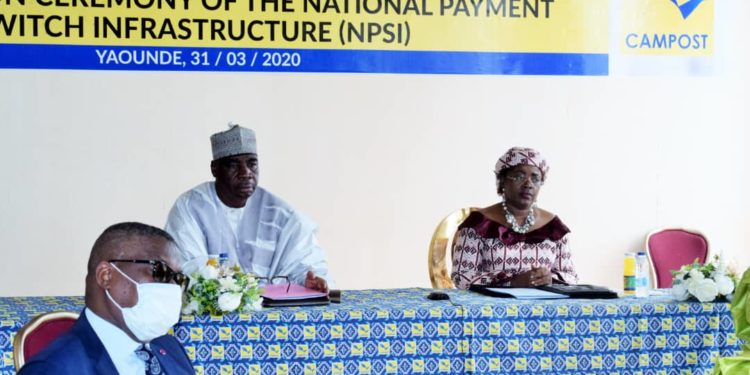The Minister of Post and Telecommunication, Minette Libom Li Likeng, has officially launched the first ever Electronic Communications Aggregation Platform in Cameroon.
It is made up of a national switch infrastructure for electronic payment and to enhance the supply of value added services.
The launching ceremony took place March 31, in Yaounde, via a video-conference that regrouped the Director General of taxes in all 10 regional delegations of CAMPOST.
The Electronic Communications Aggregation Platform project, developed by the Ministry of Post and Telecommunication, MINPOSTEL, is a platform made up of a payment transaction platform which employs electronic commission technologies to enable traditional financial service providers to offer their services through a mobile phone it Internet, as MINPOSTEL boss holds.
“The infrastructure in essence, is a hub which permits all values added service providers within the electronic communications space such as mobile payment operators to use a single USSD gateway to reach their customers.
It is also a unified Interrace for all financial service providers so to guarantee interoperability of standalone subsystems,” said Minette Libom Li Likeng.
The technological development will ease financial service providers to offer their services seamlessly across all mobile phone networks without signing a contract with each of the operators.
This will however facilitate the present procedures that are time consuming, expensive and gives room to abuses by the dominant network operators.
In a bid to ensure equitable use and access to USSD in Cameroon, the government established a national platform that permits access and payment services for electronic communication suppliers.
Therefore, this will minimise the cost of transactions and prestations for value added services of electronic communications.
In addition, the initiative will also pave the way for the traceability and storage of data in an effort to collect taxes and levies on all digital financial transactions.
Also, promoting financial inclusion from 40 percent to 98 will correspond to the current rate of mobile phone ownership by adult Cameroonians.
To this, the Minister added that, “despite the many benefits that come with mobile payment and other value added services, the main infrastructure owners notably mobile telecommunications network operators in a bid to protect the their market bases and dominant positions, have on many occasions blocked market entry to smaller yet more innovative operators, and by so doing, stifling competition and hindering games the development of new services.”
The National switch has as aim to make public postal operations at the very core of digital economy development, thus, promotes via a single gateway, the interoperability of various services offered by operators that use the national Al electronic communication network.
This would therefore be managed by Cameroon Post, CAMPOST.
It should be noted that, the rapid change in the technological landscape poses bug challenges for the sector regulators who ought to ensure equitable access to market and fight against money laundering, financial terrorism, fraud amongst others financial crimes, inherent in the electronic communication network.
Nevertheless, it was revealed that, mobile financial services have remarkably improved in Africa over the past five years.
Therefore, this swift growth in the mobile payment industry has improved access to low-cost financial services for the poor, both domestically and across borders.
It is noteworthy that, mobile phone payment technologies have revolutionised businesses, especially in developing economies enabling low-income families and micro-enterprises to have easy access to financial services.
Thus, this mode of payment promotes digital and financial inclusion as well as enables the banking of the unbanked.
By Annie Babelle Odounlami








